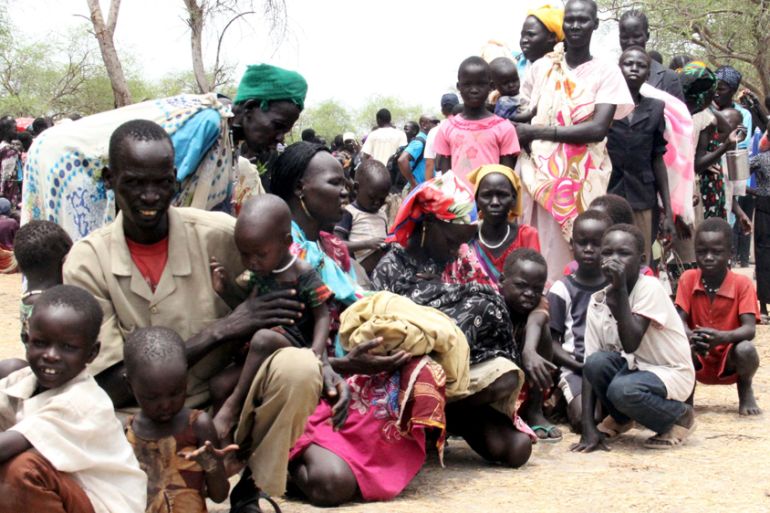South Sudan fighting surge sparks fears of catastrophe
UN says intense South Sudan fighting in town of Melut is creating an “entirely man-made catastrophe.”

South Sudanese government tanks backed by helicopter gunships have pushed back rebels from a key oil town, state television showed, as the UN condemned an “entirely man-made catastrophe.”
Tanks are shown firing as a helicopter gunship on Friday – believed to belong to the Ugandan army which is fighting alongside government troops – swoops over the burning town of Melut in the key northern oil state of Upper Nile.
Keep reading
list of 4 itemsWhy is Germany maintaining economic ties with China?
UN’s Libya envoy resigns citing no hope for political progress
UN urges restraint as Iran and Israel trade barbs at Security Council
UN rights chief Zeid Raad Al Hussein said on Friday people are “senselessly suffering through an entirely man-made catastrophe,” warning that warring forces have “managed to make a terrible situation much, much worse.”
Doctors Without Borders (MSF) on Friday warned there was an “escalating and continued use of violence against civilians” in the three battleground northern and eastern states of Unity, Upper Nile and Jonglei.
Fighting broke out in December 2013 when South Sudan’s President Salva Kiir accused his former deputy Riek Machar of attempting a coup, setting off a cycle of retaliatory killings across the country.
Melut lies some 35km west of the main oil production base at Palouch, which rebels are trying to capture. Its loss would be a crippling blow to South Sudan’s already struggling economy.
At least three heavily armoured barges, equipped with anti-aircraft guns, and used for transporting troops along the Nile river, are seen on fire in the footage, as soldiers on the river bank rake it with gunfire and rockets.
Counter-attack on Malakal
The government assault that began in late April is one of the heaviest offensives in the 17-month long civil war and has cut off over 650,000 people from aid, with gunmen raping, torching towns and looting relief supplies, according to the UN and aid agencies.
Rebels last week launched a major counter-attack, including an assault on Malakal, the state capital of Upper Nile and the gateway to the country’s last remaining major oil fields.
MSF has been forced to abandon its hospital in the town of Leer, in southern Unity State, and pull back into UN bases in Malakal and Melut.
In Jonglei, an MSF team discovered the town of New Fangak “had effectively been destroyed, with trees and homes burnt to the ground and school buildings flattened,” the mission’s chief Paul Critchley said.
“The hospital, one of the main health facilities in the northern part of the state, had been demolished.”
Amnesty International said Friday its researchers had documented extreme violence.
“Interviewees gave chilling accounts of the government forces setting entire villages on fire, killing and beating residents, looting livestock and other property, committing acts of sexual violence and abducting women and children,” Amnesty said.
Civilians who escape immediate harm are nevertheless at great risk, uprooted from their homes, fleeing with few possessions and unable to plant crops. Hunger is on the rise again.
But MSF’s Critchley said this sliver of hope was “cold comfort” for terrified and starving civilians.
“You can’t eat the rain,” he said.